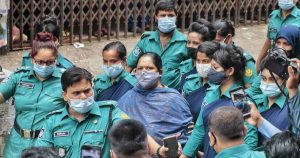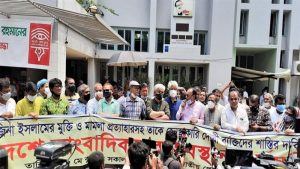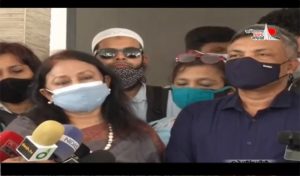In talks and discussion on the World Press Freedom Day on Thursday some intellectuals have blamed the absence of press freedom in the country on the lack of courage and self-censorship on the part of the journalists. But do their analyses depict the reality? Perhaps they don’t. The said analysts have not reflected on the structure of the media, where the basic weaknesses lie.People of all professions pay tributes to journalists for the roles they played in the past. But why they cannot play the same roles now? Journalists in Bangladesh are probably in the worst possible state to assert their freedom of expression.
Would anybody deny that the journalists of Bangladesh played a strong complimentary role in all democratic movements and in Bangladesh’s change overtime from a command economy to a mixed economy before turning into a free economy in 1991? They campaigned against mismanagement and corruption in state-owned business enterprises all those years.
Businessmen, the key beneficiaries of this transformation, now themselves own most press and media organizations but many of them do not want their journalist employees to be as free as before in their writings, news presentation and broadcasts. This situation has arisen because the investment-shy traditional newspaper publishing houses have lost ground to new owners, and some of those have even gone out of business.
The traditional newspaper publishing houses used to uphold some ideals and norms. In the past, apart from those privately owned newspaper houses, there were some socially owned papers in which journalists used to get handsome pay and had security of job. Plus they were united under one journalist union with no discrimination in securing their rights.
Since the start of mass proliferation of newspapers and emergence of privately owned television channels and radio stations since 1991, journalists have overtime turned into just another raw material in the industry. Although there are a few glorious exceptions, in most cases buildings, printing presses, computers and air-conditioners are considered fixed assets, not journalists! One can hire four newcomers by giving handshake to an old and experienced journalist who is considered costly. And the newcomers can be dispensed with at will. The other day three newly launched Dhaka newspapers were closed down. The journalists working for those organizations were in no way at fault.
In all established democracies, societies have made the key investments in press freedom. Many renowned newspapers in UK, USA and India are under social ownerships and run under trusts or endowments. Managements of such newspapers direct their journalism not on a profit and loss basis, but on the consideration of social and collective good. Other newspapers cannot ignore the standards set by them. An independent judiciary plays the supportive role.
Our intellectuals who operate from legally protected autonomous grounds while drawing salary and benefits from the government exchequer, the business leaders who are enjoying the power of laissez faire economics and the politicians who control the executive and the legislature must realise that their freedom would not be sustainable without press freedom and judicial independence.
There is a need for collective investment in press freedom so that economic, social or political pressures do not hold a journalist back from pursuing what is right, just and true. There is a need for independent foundations to promote quality journalism and look after the welfare of jobless journalists so that they do not have to surrender their conscience for livelihood. A first step in this direction can be the revival of the Press Trust that has remained dormant since the late nineties. The trust’s property, at No 1 Rajuk Avenue, Motijheel, Dhaka, if properly managed, would be adequate to run at least two newspapers in the capital by inviting qualified journalists representing all shades of opinion in our society, as was the case in the past. – Mostafa Kamal Majumder




